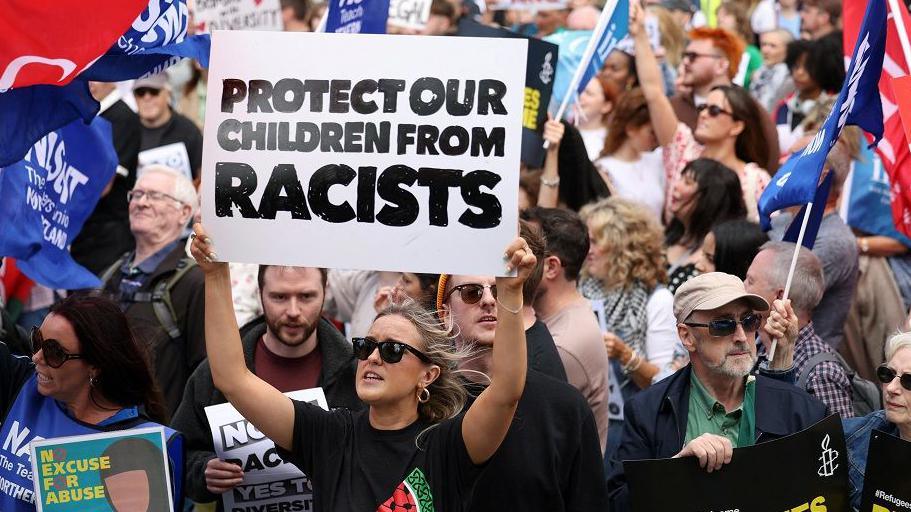Crack down on racist hate speech, UN tells UK

Anti-racism protests were held earlier this month following a wave of riots
- Published
The United Nations has urged the UK to take action to curb racist hate speech, including by politicians, in a report published on Friday.
It noted the persistence of hate speech published in mainstream media, online, and spread by politicians and public figures.
The UN said it was "particularly concerned" about racist acts and violence by "far-right and white supremacist" groups, such as during recent riots across England and Northern Ireland fuelled by misinformation and anti-immigrant sentiment.
A government spokesperson said it had taken the "toughest action" to ensure all involved in the "violent thuggery" will "face the full force of the law.
“Ministers, including the prime minister, have visited areas affected to hear from communities and faith leaders directly and to be clear that such violence and intimidation has no place in our society.”
They added there was "no excuse for the hatred, violence and intimidation" that recently occurred.
The UN's recommendations came from its four-year review, external of the UK’s record on tackling racial discrimination – a requirement for countries signed on to international conventions.
The report did not single out specific politicians or instances, but urged authorities to “formally and publicly reject and condemn hate speech and the dissemination of racist ideas".
The UN Committee for the Elimination of Racial Discrimination urged the UK to address alleged racial profiling by police and discrimination in criminal justice, housing, schools and healthcare.
It also said it was especially concerned by the persistence and in some cases "sharp increase" of hate crimes and hate speech in the UK.
The committee highlighted what they said were recurring racist acts and violence against minorities, asylum seekers and refugees, including during riots in late July and early August.
The UN characterised authorities as having taken “swift action” in response.
At least 466 people have been charged with crimes related to the riots, some of which targeted mosques and hotels housing asylum seekers.
Prime Minister Keir Starmer at the time said the riots were the "actions of a tiny, mindless minority" and condemned "far-right hatred".
The UN recommended that the UK prevent racist hate crimes by encouraging reporting to police, prosecuting perpetrators, and strengthening measures to combat hate speech on social media, among other measures.
Much of the evidence considered by the committee would have been collected before the general election and the riots.
The UN said the UK had taken some legislative steps in recent years, noting that Scotland brought in a hate crime strategy and Wales introduced an action plan to eliminate racism.
However, the global body remained concerned about the level of hate crimes and xenophobic speech targeting ethnic minorities, specifically Gypsies, Roma, Travellers, people of African, Asian or Arab descent, Jews, Muslims and Hindus, as well as migrants, refugees and asylum seekers.
The committee urged the UK to hold journalists and news organisations accountable for how they describe minority communities and when they publish content that incites hatred or fuels xenophobic attitudes.
The review also urged the UK to improve the situation for migrants and refugees and tackle racial discrimination in other areas such as policing.
Improvements were needed across the criminal justice system for people to feel safe enough to report racist incidents and stamp out the continued problem of racial profiling, the UN said.
The global body said it was particularly concerned about the high number of strip searches, especially "children of African descent", and the increased presence of police at schools with large non-white populations.
The report called for an independent body to investigate allegations of racial profiling by police, saying stop and search had a disproportionate impact on "people of African and Asian descent, and especially young men and children".
The UN said ethnic minorities still suffered discrimination across a broad range of areas, including housing, schooling and access to healthcare.
In UK schools, pupils remained subject to racially-motivated bullying and prejudice, particularly "pupils belonging to Gypsy, Roma and Traveller communities and pupils of African descent", the report added.
The committee also criticised the UK's counter-terrorism Prevent scheme, which requires public bodies to refer individuals it considers as at risk of being radicalised to officials.
It called for the referral obligation to be suspended over concerns it has created an "atmosphere of suspicion" towards Muslim communities and had a "negative impact" on their freedoms and rights.
Following the report's publication, Amnesty International UK urged the government to go further and scrap the Prevent scheme altogether, saying it had caused "immense harm" to minority communities.
All UN member states are reviewed regularly by the UN to assess their compliance with international conventions.
Belarus, Bosnia, Iran, Pakistan, and Venezuela were the other countries reviewed this session.